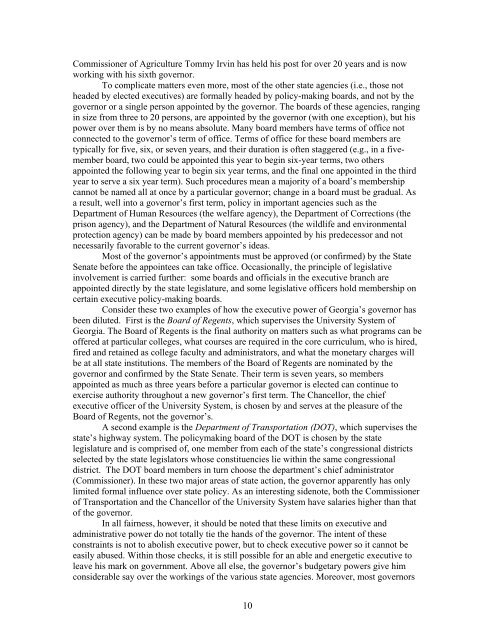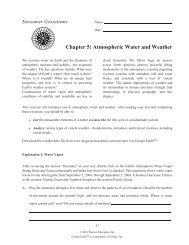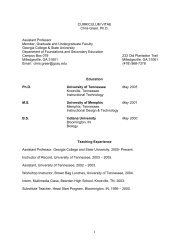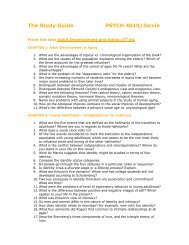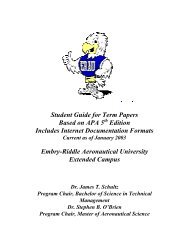THE GOVERNMENT OF GEORGIA
THE GOVERNMENT OF GEORGIA
THE GOVERNMENT OF GEORGIA
Create successful ePaper yourself
Turn your PDF publications into a flip-book with our unique Google optimized e-Paper software.
Commissioner of Agriculture Tommy Irvin has held his post for over 20 years and is nowworking with his sixth governor.To complicate matters even more, most of the other state agencies (i.e., those notheaded by elected executives) are formally headed by policy-making boards, and not by thegovernor or a single person appointed by the governor. The boards of these agencies, rangingin size from three to 20 persons, are appointed by the governor (with one exception), but hispower over them is by no means absolute. Many board members have terms of office notconnected to the governor’s term of office. Terms of office for these board members aretypically for five, six, or seven years, and their duration is often staggered (e.g., in a fivememberboard, two could be appointed this year to begin six-year terms, two othersappointed the following year to begin six year terms, and the final one appointed in the thirdyear to serve a six year term). Such procedures mean a majority of a board’s membershipcannot be named all at once by a particular governor; change in a board must be gradual. Asa result, well into a governor’s first term, policy in important agencies such as theDepartment of Human Resources (the welfare agency), the Department of Corrections (theprison agency), and the Department of Natural Resources (the wildlife and environmentalprotection agency) can be made by board members appointed by his predecessor and notnecessarily favorable to the current governor’s ideas.Most of the governor’s appointments must be approved (or confirmed) by the StateSenate before the appointees can take office. Occasionally, the principle of legislativeinvolvement is carried further: some boards and officials in the executive branch areappointed directly by the state legislature, and some legislative officers hold membership oncertain executive policy-making boards.Consider these two examples of how the executive power of Georgia’s governor hasbeen diluted. First is the Board of Regents, which supervises the University System ofGeorgia. The Board of Regents is the final authority on matters such as what programs can beoffered at particular colleges, what courses are required in the core curriculum, who is hired,fired and retained as college faculty and administrators, and what the monetary charges willbe at all state institutions. The members of the Board of Regents are nominated by thegovernor and confirmed by the State Senate. Their term is seven years, so membersappointed as much as three years before a particular governor is elected can continue toexercise authority throughout a new governor’s first term. The Chancellor, the chiefexecutive officer of the University System, is chosen by and serves at the pleasure of theBoard of Regents, not the governor’s.A second example is the Department of Transportation (DOT), which supervises thestate’s highway system. The policymaking board of the DOT is chosen by the statelegislature and is comprised of, one member from each of the state’s congressional districtsselected by the state legislators whose constituencies lie within the same congressionaldistrict. The DOT board members in turn choose the department’s chief administrator(Commissioner). In these two major areas of state action, the governor apparently has onlylimited formal influence over state policy. As an interesting sidenote, both the Commissionerof Transportation and the Chancellor of the University System have salaries higher than thatof the governor.In all fairness, however, it should be noted that these limits on executive andadministrative power do not totally tie the hands of the governor. The intent of theseconstraints is not to abolish executive power, but to check executive power so it cannot beeasily abused. Within those checks, it is still possible for an able and energetic executive toleave his mark on government. Above all else, the governor’s budgetary powers give himconsiderable say over the workings of the various state agencies. Moreover, most governors10


